DECR chairman recounts to scientists the history of the Russian Orthodox Church’s external work
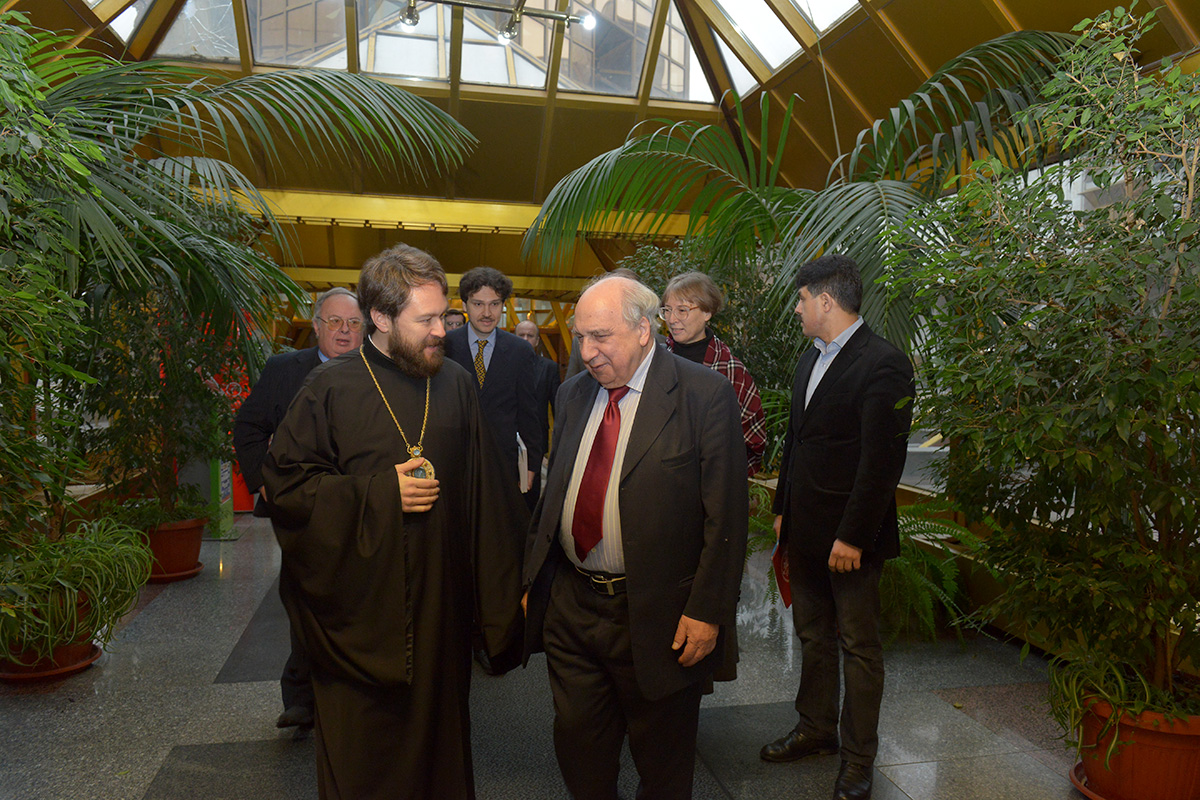
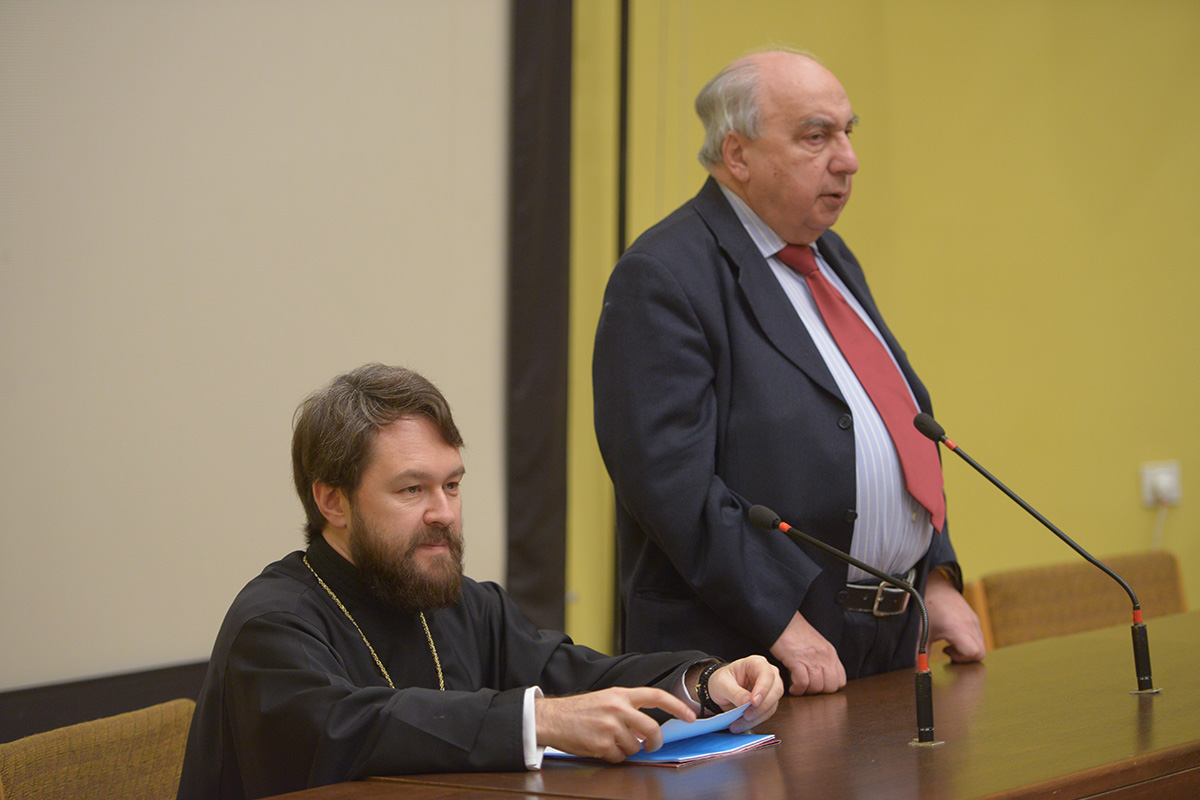
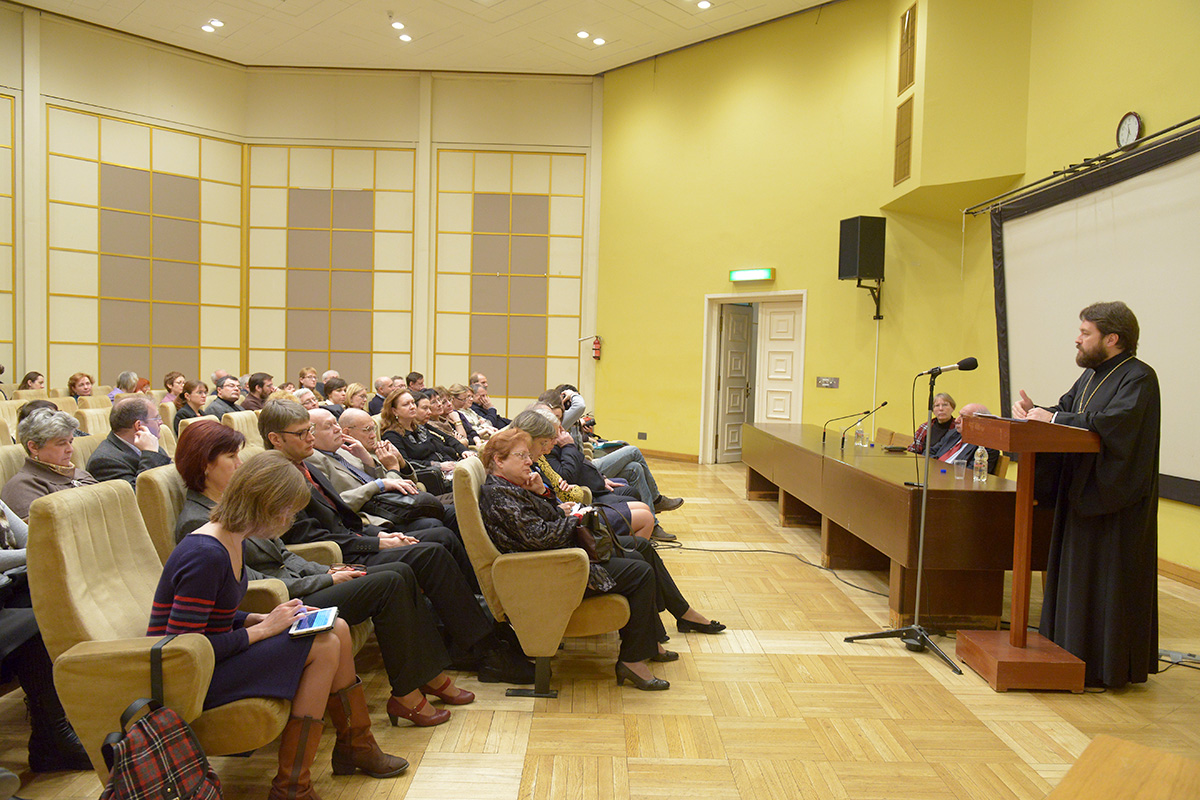
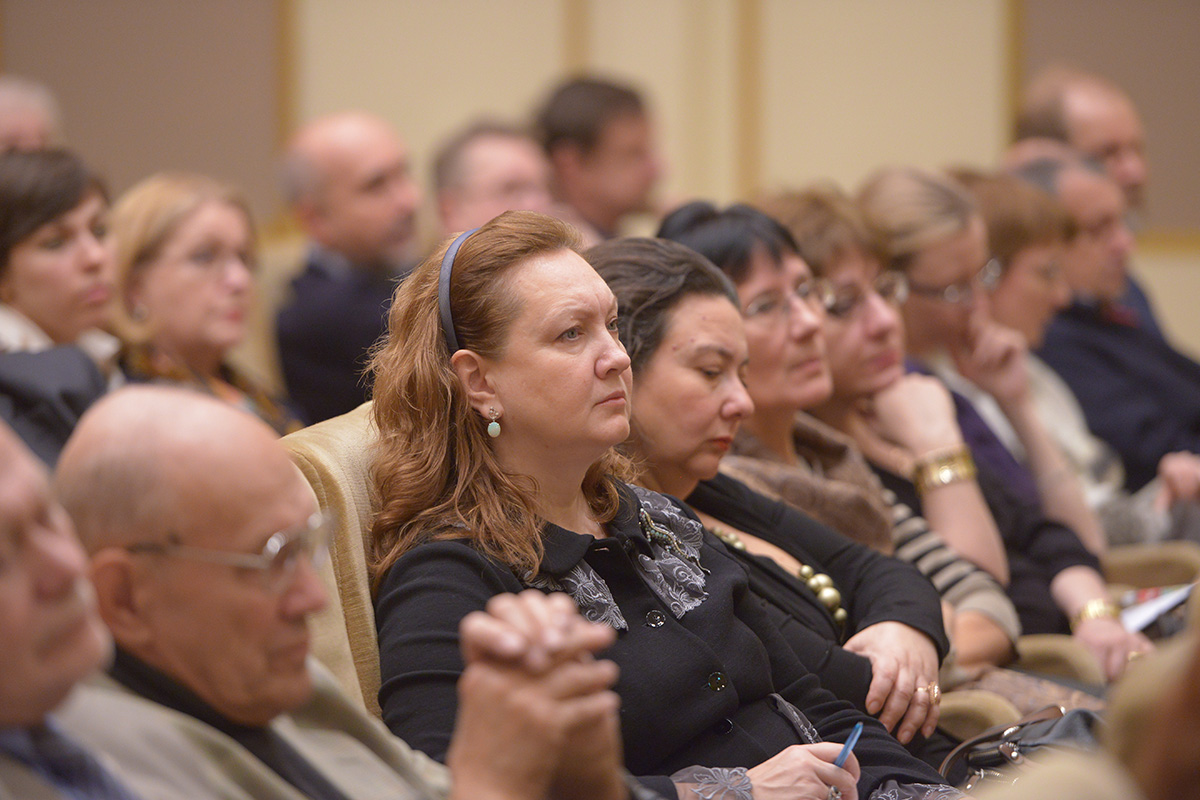

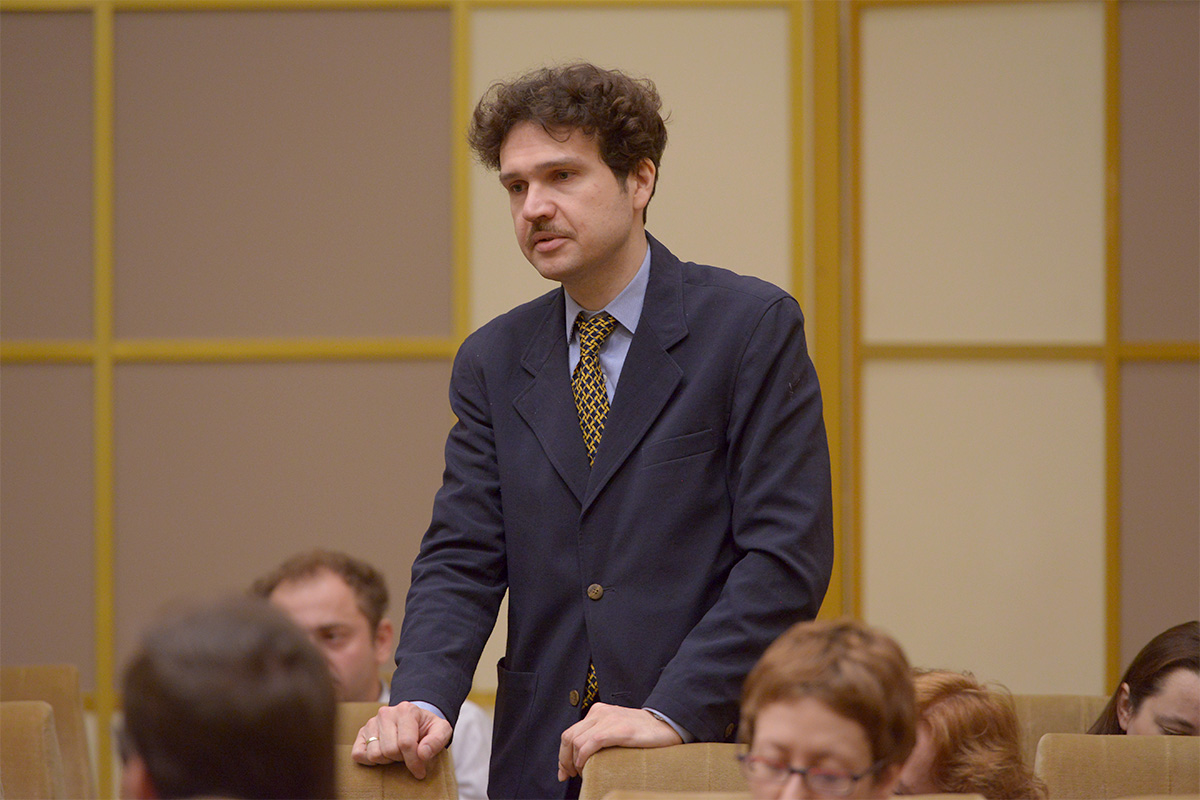


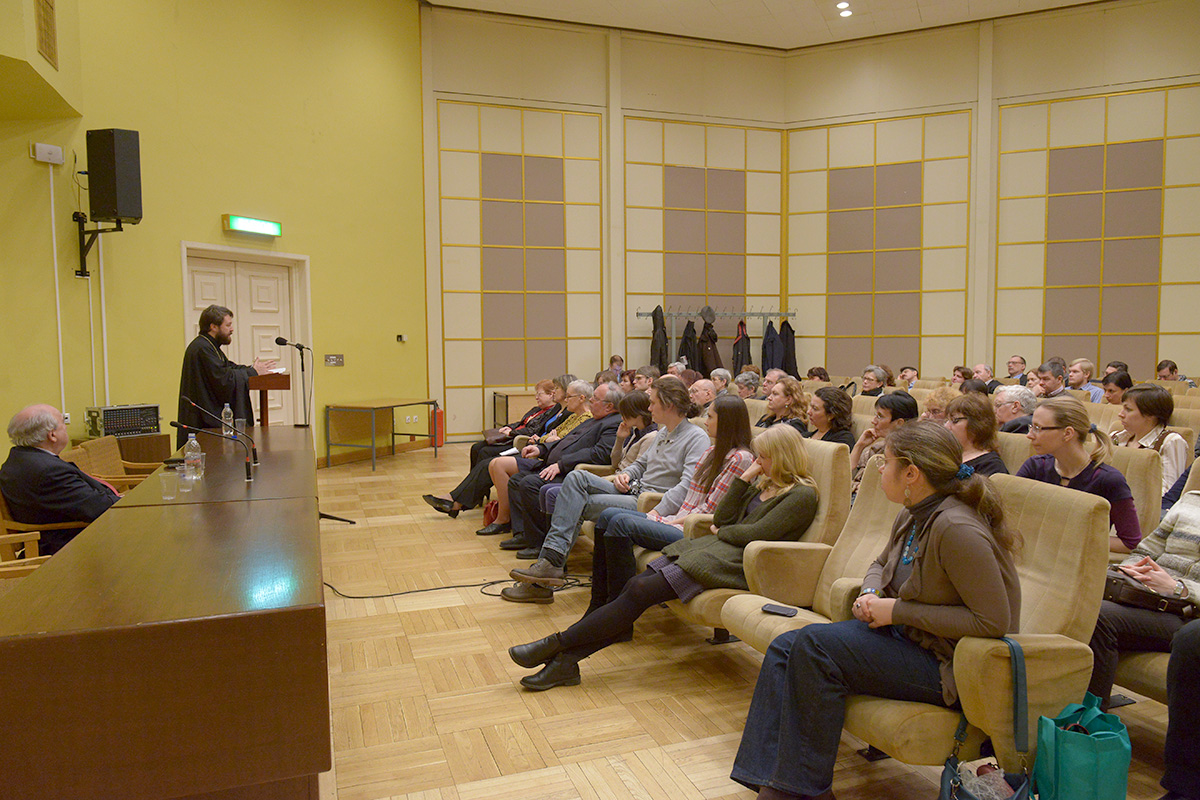
On December 23, 2013, Metropolitan Hilarion of Volokolamsk addressed the staff of the Russian Academy of Sciences’ Institute of World History, on the Institute’s director’s invitation. He spoke on inter-Christian relations.
The metropolitan noted that the Russian Orthodox Church did not have an international policy of her own up to the mid-20th century. Before the 1917 Revolution, the international policy – including the Church’s policy since she was not separated from the state – was supervised by the Russian Empire’s Ministry of Foreign Affairs. In the first decades of the Soviet power, the Russian Church was subjected to severe persecution and was almost completely isolated, saving isolated relations by correspondence between His Holiness Patriarch Tikhon and later Metropolitan Sergiy (Stragorodsky) with the Russian Diaspora. “One of the reasons for the wreckage of relations between our Diaspora and the Church within the Fatherland lied precisely in the fact that in the situation of persecution it was impossible to establish full-fledged international work including correspondence”, His Eminence said.
It was only in the post-war time that an opportunity was opened up for the Russian Orthodox Church to come out to the international arena. Particularly, some hierarchs were permitted to exit the country to meet with representatives of the Russian Diaspora and emigration. Besides, after a long interruption, the Russian Church could resume contacts with Catholics and Protestants.
To coordinate the international work, in 1946 Moscow Patriarchate established a Department for External Church Relations. Metropolitan Hilarion told his audience about the hierarchs who directed this Synodal department in various periods of time. The most prominent among them are rightly considered to be Metropolitan Nikodim (Rotov) of Leningrad and Novgorod and the present Primate of the Russian Orthodox Church, His Holiness Patriarch Kirill of Moscow and All Russia.
“Metropolitan Nikodim managed to use the international work of the Russian Orthodox Church to protect the interests of the Church within the country”, Metropolitan Hilarion stressed, “He persuaded the Soviet leaders to accept that for the Church to speak at international conferences including those in defence of peace, she needed fresh resources, namely, young educated bishops who could adequately represent the Church. With the authorities’ permission, such bishops were consecrated. They were first sent for service abroad and a few years later came back to fill in the episcopal chairs that had become vacant. In this way, Metropolitan Nikodim, through his own efforts and at the price of his health – he died at the age of 49 after the seventh stroke – restored in the 60s and 70s the episcopate of the Russian Orthodox Church. Moreover, today, 35 years after his demise, the Church is still led by those whom he promoted in his time”. Among them are Patriarch Kirill of Moscow and All Russia, Metropolitan Vladimir of Kiev and All Ukraine, Metropolitan Filaret of Minsk and Slutsk, Patriarch Exarch for All Belarus; Metropolitan Vladimir of St. Petersburg. Among Metropolitan Nikodim’s protégé was also the late Patriarch Alexy II.
“The 1990s and 2000s, the period when the Department for External Church Relations was directed Metropolitan Kirill of Smolensk and Kaliningrad (now Patriarch of Moscow and All Russia), was a time of radical changes in the modern history of our Fatherland, when the great country disintegrated into several states, and the Church had to build anew her relations with the civil authorities in these states. It was one of the primary tasks of the DECR. Besides, at the new stage it was necessary to build the whole system of inter-Orthodox and inter-Christian relations… In fact, it was Metropolitan Kirill who defined many aspects of our Church’s internal policy and the whole of her policy in external affairs”, His Eminence said.
Addressing the subject of inter-Christian relations, in particular the Orthodox-Catholic dialogue, Metropolitan Hilarion reminded the audience that there are still obstacles for rapprochement after the 1054 schism. These are the problem of filioque, that is, the procession of the Holy Spirit, the dogma on the immaculate conception of the Most Holy Theotokos, and the teaching on primacy of the Pope. Until the 19th century, the Russian Orthodox Church and the Roman Catholic Church regarded each other as heretical – which implies among other things the absence of liturgical communion. “In the 19th century and especially the 20s century, we can register the factual recognition of the validity of the Sacraments in the absence of communion in the Sacraments”, the archpastor stated.
Vatican II convened by Pope John XXII became a key point in the Orthodox-Catholic relations. “It was at that time that the position of the Catholic Church with regard to Orthodoxy was reconsidered. While earlier the Orthodox were described as schismatics and heretics separated from the Church and the Orthodox Church as a heretical community with no valid Sacraments, Vatican II proposed completely different formulations. The Orthodox Churches began to be seen as possessing the apostolic continuity of hierarchies and valid Sacraments but not having communion with Rome”, Metropolitan Hilarion explained, noting that this naturally changed the attitude towards the Catholics which used to prevail in the Orthodox milieu.
The DECR chairman indicated that since that time a serious progress has been made in the Orthodox-Catholic relations both on pan-Orthodox and bilateral levels. In the 60s and 70s, talks began to prepare a full-scale theological dialogue between the Orthodox and the Catholics. Officially this dialogue was opened in 1980 and is still continued. “The very entering into dialogue – and all the Local Orthodox Churches entered into it – meant a moratorium on using the term “heresy” and “heretic” with regard to the Catholic Church”, Metropolitan Hilarion stated, “We both abandoned the classification of each other as heretics. We carry on the dialogue with the aim to clarify relations and positions and perhaps to bring them closer together where such closeness is possible”. The dialogue produced several theological documents. The main achievement, according to the DECR head, is the 1993 Balamand Document, in which the both sides agree that unia is not a method of achieving church unity. It was very important in the light of the intensified work of the Greek Catholics in western Ukraine, Romania and some other countries.
Since 2006, the dialogue members have discussed the issue of synodality and primacy in the Universal Church, especially the role of the Bishop of Rome as the Orthodox see this role both as it is today and as it was in the first millennium.
In his remarks, Metropolitan Hilarion stressed the two completely different models of church order existing in East and West. “Just as papacy in the West resulted from a long two millennia-long development, the absence of papacy in the East is conditioned by the same two millennia-long development, including in polemic with Catholicism. Indeed, in the course of this polemic, one of the primary cases made against papacy by Orthodox Churches was the fact that it is the Lord Jesus Christ who is the single Head of the Church. It is he who heads the Universal Church, and he has no vicar on the earth. And on the human level, the Universal Church consists of Local Orthodox Churches, each headed by Patriarch, Metropolitan or Archbishop and having a conciliar system of governance”, the archpastor explained.
He also spoke about the relations with Oriental (non-Chalcedonian) Churches and shared difficulties encountered in relations with Protestant communities increasingly prone to the influence of liberalization leading in some cases to the introduction of female priesthood and the blessing of same-sex unions. “There are fewer and fewer common grounds”, the metropolitan stated.
In conclusion of his address, Metropolitan Hilarion answered questions concerning in particular a possible positive dynamic in relations with the Roman Catholic Church, the situation in Ukraine and preparations for a Pan-Orthodox Council. Answering the first question, he pointed to the common challenges facing Christians, such as the secularization, eroding traditional family values and threat to the Christian presence the Middle East. “We should not expect any results of the theological dialogue until we begin cooperating. Indeed, the problem of protecting Christians in the Middle East, who are subjected to real genocide today, admits of no delay. We cannot wait for years or decades until we achieve unity and accord on other problems. It is a problem that needs to be addressed together here and now”, he insisted.
Academician A. Chubarian, director of the RAS’s Institute of World History, thanked the guest for the address, saying, “For us, the study of Orthodoxy in Russia is one of the central tasks, also in the light of new textbooks to be prepared and the project to be carried out on the theme “The History of the Russian Orthodoxy Abroad”.
